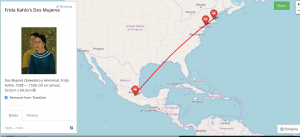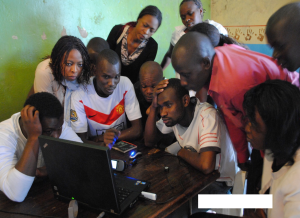Fall 2017 Public Lecture Series
Emory University, Atlanta
All public lectures will begin at 5.30 PM and take place in the Woodruff Library Jones Room.
Wednesday, 20 September
Mapping Paintings, Or How to Breathe Life into Provenance

Digital mapping has become one of the most prevalent means of visualizing data sets in a range of disciplines and of publication types. Art history is usually not associated with data, particularly with defined data, since some of its most important contributions involve critical interpretations based on close looking by individual viewers. However, one of the most available sources of data in art history is the provenance of artworks, the history of who owned artworks and where and when those artworks were displayed. Geographic mapping of provenance data allows the visualization of one of the central concerns of art history: the contexts of an artwork throughout the course of its ‘life’. This talk will consider three case studies of digital mapping and consider the ways in which geographic mapping foregrounds both the objecthood of the involved artworks and the dynamic relationships between people, places, and artworks. Attention will also be given to how such reprioritization aligns with recent theoretical paradigms in the field and, in turn, suggests new possibilities for the discipline of art history as it is explored in more traditional media.
Jodi Cranston, Professor in the Department of History of Art and Architecture at Boston University, is the author of The Poetics of Portraiture in the Italian Renaissance and The Muddied Mirror: Materiality and Facture in Titian’s Later Paintings, Green Worlds of Renaissance Venice (in press), and editor and contributor to Venetian Painting Matters, 1450-1750. She recently received a Kress Foundation digital grant to develop Mapping Paintings, a mapping platform for users to visualize the provenance of any painting, drawing, or print. This project builds on her first digital project, Mapping Titian.
Monday, 13 November
 In recent years, African states, development practitioners, and venture capitalists alike have become increasingly interested in how digital technologies can be harnessed to reduce poverty, spur democracy, and mitigate other forms of social inequality. Nairobi, Kenya has been at the center of such conversations, as it is a rapidly changing African city marked by both a vibrant local technology sector and extreme inequality. In this talk, Poggiali draws on over two years of ethnographic research with a digital mapping project conceived in Nairobi’s elite spaces of technology production and deployed in its informal settlements. By focusing on both the content and form of the maps, she explores how digital spatial data became imbricated in the ethical and political project of development, and shows how open source digital mapping platforms, in particular, became a battleground on which claims about political belonging and inequality played out.
In recent years, African states, development practitioners, and venture capitalists alike have become increasingly interested in how digital technologies can be harnessed to reduce poverty, spur democracy, and mitigate other forms of social inequality. Nairobi, Kenya has been at the center of such conversations, as it is a rapidly changing African city marked by both a vibrant local technology sector and extreme inequality. In this talk, Poggiali draws on over two years of ethnographic research with a digital mapping project conceived in Nairobi’s elite spaces of technology production and deployed in its informal settlements. By focusing on both the content and form of the maps, she explores how digital spatial data became imbricated in the ethical and political project of development, and shows how open source digital mapping platforms, in particular, became a battleground on which claims about political belonging and inequality played out.
Lisa Poggiali is a Postdoctoral Fellow at the Price Center for Digital Humanities at the University of Pennsylvania. Her research explores how information and communications technologies shape social and political life in urban Africa. Her work has appeared in the journals Cultural Anthropology and Africa, and she has a chapter in the edited volume Digital Media and the Future(s) of Democracy, forthcoming from University of Pennsylvania Press. Her research has been generously funded by various institutions, including the National Science Foundation, the Social Science Research Council, the Fulbright-Hays, and the Wenner-Gren Foundation for Anthropological Research. She holds a Ph.D from Stanford University’s Anthropology Department and an M.A. from the School of Oriental and African Studies, University of London. She is currently working on a book manuscript based on her dissertation research.